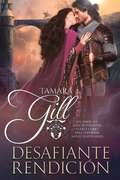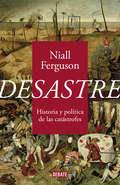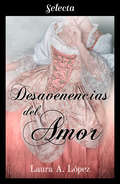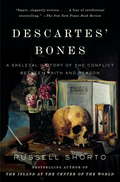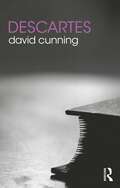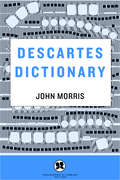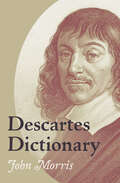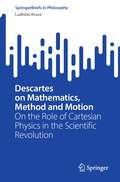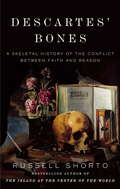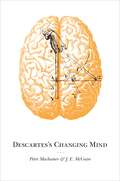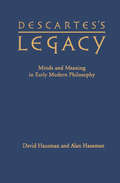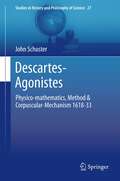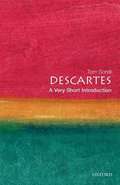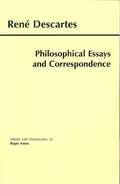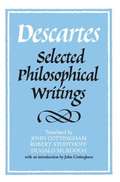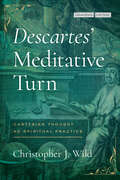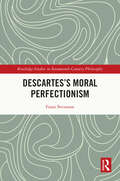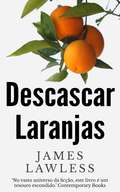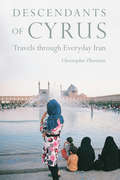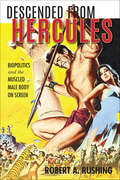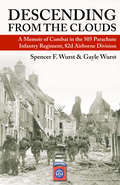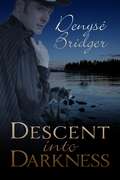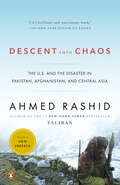- Table View
- List View
Desafiante Rendición: Un romance medieval que viajó en el tiempo
by Tamara GillInfeliz en el amor, Maddie St. Clair se esconde detrás de una tienda de antiguedades y su pasatiempo de búsqueda de antigüedades en el barro. Eso es hasta que encuentra un anillo medieval que la envía a Cumberland del año de 1102 y a la vida de Lady Madeline Vincent, heredera de tierras normandas, a punto de casarse con un barón aristócrata, William Dowell, novecientos años mayor que ella. Lord William Dowell protege a los suyos, especialmente de su vecino más cercano y enemigo de larga data el Barón de Aimecourt. Obligado a casarse con la hija de su enemigo muerto, Lady Madeline, por decreto del Rey, oculta su creciente respeto por su esposa detrás de una amante desvergonzada. Sin embargo, cuando la vida de Madeline se ve amenazada, la lealtad de William a sus parientes es probada por el asombroso deseo que crece entre ellos; sin mencionar el amor que Madeline enciende en su corazón, que duraría una eternidad. Si el destino lo permite . . .
Desastre: Historia y política de las catástrofes
by Niall FergusonUna historia de las catástrofes deslumbrante, original y repleta de ideas para el futuro que pone en perspectiva el ya conocido como annus horribilis. Los desastres son difíciles de prever, pero en la actualidad deberíamos estar mejor preparados contra las catástrofes que los romanos cuando el Vesubio entró en erupción o que los italianos cuando golpeó la Peste Negra en la Edad Media. Al fin y al cabo, nosotros contamos con la ciencia. Sin embargo, tal y como ha quedado demostrado con la crisis del coronavirus, la respuesta de la mayoría de países desarrollados ante un nuevo patógeno ha sido más bien torpe. ¿Cómo es posible? Niall Ferguson sostiene, entre muchas otras cosas, que estaban en juego patologías previas arraigadas ya visibles en nuestras respuestas a otros desastres del pasado. Desde diversas disciplinas, incluidas la economía y la ciencia de redes, Desastre ofrece no solo una historia,sino también una teoría general de los desastres, y expone cómo nuestros complejos y atrofiados sistemas de gobernanza son incapaces de afrontar las crisis. Como muestra Ferguson, los gobiernos deben aprender a ser menos burocráticos y más resilientes si quieren evitar un declive irreversible. La crítica ha dicho...«No se trata de un virus, sino de una colisión de política, pánico, medios digitales, comportamiento humano e incompetencia. Desastre analiza cada uno de estos aspectos, poniéndolos en perspectiva histórica en una obra de deslumbrante alcance y rigor.»The Spectator «Ferguson se vale de su prodigioso intelecto para situar la pandemia en un lienzo histórico más amplio.»Financial Times «Perspicaz, exhaustivo, provocador y francamente brillante.»The New York Times «Una historia magnífica sobre el olvidado arte de gestionar una crisis.»The Telegraph «Ferguson es el historiador más brillante de su generación. Su escritura es extraordinaria.»Time «Niall Ferguson sitúa la pandemia en la más amplia de las perspectivas históricas y nos recuerda que esta no es la primera vez que los seres humanos han tenido que lidiar con una catástrofe. Basándose en un profundo conocimiento de la historia global, cataloga las amenazas a las que se ha enfrentado la humanidad y las formas ingeniosas en que las sociedades humanas las han afrontado.»Francis Fukuyama «Los seres humanos tenemos tantas maneras posibles de sufrir un terrible desastre que uno pensaría que deberíamos haber desarrollado una mejor capacidad de respuesta. En su extenso, sintético y atractivo libro, este historiador maestro explica por qué no ha sido así y ofrece un camino a seguir para encontrar soluciones más seguras y sensatas la próxima vez que nos enfrentemos una catástrofe.»Nicholas A. Christakis
Desavenencias del amor
by Laura A. López¿Estás preparado para debutar en el amor? Lady Melody Stratford, hija del duque de Montrose e también hijastra de la rebelde lady Violet Lowel, espera su debut para la próxima primavera. Ella tenía la esperanza de bailar en los grandes salones de Londres y conocer a un caballero que pidiera su mano. Sin embargo, la floreciente primavera no le llevaría el amor, sino un viento frío de invierno, y la acercaría a lord Brendan Carlsberg, conde de Londonderry. Una mirada, una borrachera y un beso serán el principio de un pequeño sentimiento parecido al amor.
Descarte's Bones
by Russell ShortoA New York Times Notable Book. Sixteen years after René Descartes' death in Stockholm in 1650, a pious French ambassador exhumed the remains of the controversial philosopher to transport them back to Paris. Thus began a 350-year saga that saw Descartes' bones traverse a continent, passing between kings, philosophers, poets, and painters. But as Russell Shorto shows in this deeply engaging book, Descartes' bones also played a role in some of the most momentous episodes in history, which are also part of the philosopher's metaphorical remains: the birth of science, the rise of democracy, and the earliest debates between reason and faith. Descartes' Bones is a flesh-and-blood story about the battle between religion and rationalism that rages to this day.
Descartes
by John Cottingham Robert StoothoffPhilosophy is one of the most intimidating and difficult of disciplines, as any of its students can attest. This book is an important entry in a distinctive new series from Routledge:The Great Philosophers. Breaking down obstacles to understanding the ideas of history's greatest thinkers, these brief, accessible, and affordable volumes offer essential introductions to the great philosophers of the Western tradition from Plato to Wittgenstein. In just 64 pages, each author, a specialist on his subject, places the philosopher and his ideas into historical perspective. Each volume explains, in simple terms, the basic concepts, enriching the narrative through the effective use of biographical detail. And instead of attempting to explain the philosopher's entire intellectual history, which can be daunting, this series takes one central theme in each philosopher's work, using it to unfold the philosopher's thoughts.
Descartes (The Routledge Philosophers)
by David CunningRené Descartes (1596–1650) is well-known for his introspective turn away from sensible bodies and toward non-sensory ideas of mind, body, and God. Such a turn is appropriate, Descartes supposes, but only once in the course of life, and only to arrive at a more accurate picture of reality that we then incorporate in everyday embodied life. In this clear and engaging book David Cunning introduces and examines the full range of Descartes’ philosophy. A central focus of the book is Descartes’ view that embodied human beings become more perfect to the degree that they move in the direction of finite approximations of independence, activity, immutability, and increased knowledge. Beginning with an introduction and a chapter on Descartes’ life and works, Cunning also addresses the following key topics: Descartes on the wonders of the material universe skepticism as epistemic garbage, and the easy dissolution of hyperbolic doubt Descartes’ three arguments for the existence of God the ontology of possibility and necessity freedom and embodiment arguments for the immateriality of mind sensible bodies and the pragmatic certainty by which to navigate them Descartes’ stoic view on how best to live. Descartes is an outstanding introduction to one of the greatest of Western philosophers. Including a chronology, suggestions for further reading, and a glossary of key terms, it is essential reading for anyone studying Descartes and the history of modern philosophy.
Descartes Dictionary
by John MorrisThe purpose of this Descartes Dictionary is to bring together as many as possible of the technical and special terms in Descartes' writings with their definitions in Descartes' own words. There are also implicit characterizations of the meanings of many words, and a handful of entries were included simply for their own sake--because Descartes had something interesting to say about his life and world. All of the entries, or almost all of them, have been newly translated for this volume. There are many reasons for preparing new translations: the language in the older translations is archaic and often inaccurate; many of Descartes' most important works have never been translated into English; and modern translations vary in quality and style. What is most important, though, is that the old translations simply failed to pay attention to the technical language that Descartes used, and so blurred some of the most important distinctions that he made. Professor Morris is on the faculty of Kirkland College.
Descartes Dictionary
by John MorrisAn accessible guide to understanding many of the complex technical and special terms implemented by the seventeenth-century philosopher. French philosopher René Descartes authored many works in his lifetime like Discourse on the Method and Principles of Philosophy. But while his &“I think, therefore I am&” may be easy to grasp, much of the terminology he uses can be challenging. Descartes would frequently introduce terms in his writings without explanation, and if there were such a definition, it is in one of his letters or an obscure, unpublished work. In Descartes Dictionary, author John M. Morris collects as many as possible of the technical and special phrases Descartes employed in his writings along with their definitions in Descartes&’s own words. This volume is a great companion book for anyone studying the philosopher&’s works and will certainly enrich their understanding.
Descartes on Mathematics, Method and Motion: On the Role of Cartesian Physics in the Scientific Revolution (SpringerBriefs in Philosophy)
by Ladislav KvaszThis book argues that Descartes’ physics was a milestone on the road to modern mathematical physics. After Newton introduced a completely different approach to mathematical description of motion, Descartes’ physics became obsolete and even difficult to comprehend. This text follows the language of Descartes and the means of which motion can be described. It argues that Descartes achieved almost everything that later Newton was able to do—to describe the motion of interacting bodies- by different (i.e. algebraic) means. This volume completely refutes the received view according to which Descartes’ physics was merely a kind of discursive natural philosophy. To make this interpretation more plausible the book follows Descartes’ ideas from his early work in mathematics, through his invention of the analytic method towards his mature physics. It shows that Descartes followed a similar heuristic pattern.The volume appeals to students and researchers; it invites the reader equippedwith minimal understanding of college mathematics to follow Descartes on his intellectual journey through the Scientific Revolution. The reader will gain a deeper understanding of the role of mathematical language in the creation of modern physics and a glimpse into the fascinating world of Descartes’ scientific thought. Several of Descartes’ philosophical ideas can be traced back to his scientific interests and thus the book elucidates the motivation behind some of Descartes’ key positions in the area of epistemology and method. In the penultimate chapter the book presents four arguments in favor of seeing Descartes as a physicist on par with Galileo and Newton.
Descartes' Bones: A Skeletal History of the Conflict between Faith and Reason
by Russell ShortoSixteen years after René Descartes' death in Stockholm in 1650, a pious French ambassador exhumed the remains of the controversial philosopher to transport them back to Paris. Thus began a 350-year saga that saw Descartes' bones traverse a continent, passing between kings, philosophers, poets, and painters. But as Russell Shorto shows in this deeply engaging book, Descartes' bones also played a role in some of the most momentous episodes in history, which are also part of the philosopher's metaphorical remains: the birth of science, the rise of democracy, and the earliest debates between reason and faith. Descartes' Bones is a flesh-and-blood story about the battle between religion and rationalism that rages to this day.
Descartes' Meditations
by Karen DetlefsenDescartes's Meditations, one of the most influential works in western philosophy, continues to provoke discussion and debate. This volume of original essays by leading established and emerging early modern scholars ranges over all six of the Meditations and explores issues such as scepticism, judgement, causation, the nature of meditation and the meditator's relation to God, the nature of personhood, Descartes' theory of sense perception, and his ideas on the nature of substance. The contributors bring new insights to both central and less-studied topics in the Meditations, and connect the work with the rich historical and intellectual context in which Descartes forged his thought. The resulting volume will appeal to a wide range of scholars of early modern thought.
Descartes's Changing Mind
by Peter Machamer J. E. McGuireDescartes's works are often treated as a unified, unchanging whole. But in Descartes's Changing Mind, Peter Machamer and J. E. McGuire argue that the philosopher's views, particularly in natural philosophy, actually change radically between his early and later works--and that any interpretation of Descartes must take account of these changes. The first comprehensive study of the most significant of these shifts, this book also provides a new picture of the development of Cartesian science, epistemology, and metaphysics. No changes in Descartes's thought are more significant than those that occur between the major works The World (1633) and Principles of Philosophy (1644). Often seen as two versions of the same natural philosophy, these works are in fact profoundly different, containing distinct conceptions of causality and epistemology. Machamer and McGuire trace the implications of these changes and others that follow from them, including Descartes's rejection of the method of abstraction as a means of acquiring knowledge, his insistence on the infinitude of God's power, and his claim that human knowledge is limited to that which enables us to grasp the workings of the world and develop scientific theories.
Descartes's Legacy
by Alan Hausman David HausmanDebates current in the philosophy of mind regarding the gathering and processing of information, and the nature of perception and representation, also animated some of the most important figures in early modern philosophy, among them Descartes, Hume, and Berkeley. The authors of Descartes's Legacy: Minds and Meaning in Early Modern Philosophy use certain problems in contemporary information theory to elucidate the concerns of the early modern philosophers. This critical study attempts to uncover what was once called the logic of the theory of ideas, and to explore the questions it was meant to solve, given the limits of the ontological categories available. The authors begin their discussion of Descartes by examining his response to established models of perception in light of his understanding of the contemporary new science. Since Descartes proposed that any likeness between representation and the thing represented was unreliable, what was his solution to how an internal representation, an idea, gives us information? The authors' central claim is that Descartes's answer to the problem of how the mind knows matter involves a theory of 'intentional ideas.' This provocative divergence from recent discussions of Descartes's philosophy of mind, which have revolved around whether he is a 'realist' or a 'representationalist,' leads the authors to consider the idealism of Hume and Berkeley in light of Descartes's notion of the intentional. Hume and Berkeley, they maintain, explored alternatives to Descartes's conception, which led them to abandon traditional notions of meaning and truth. Descartes's Legacy concludes by suggesting that Descartes's picture can be reconciled with twentieth-century materialism, and asking whether the philosophy of mind can live without a primitive notion of the intentional.By shedding light on Descartes's crucial ontological innovation and on Hume's and Berkeley's reactions to it, the authors of Descartes's Legacy have repositioned early modern philosophy within a truly contemporary framework.
Descartes-Agonistes
by John SchusterThis book reconstructs key aspects of the early career of Descartes from 1618 to 1633; that is, up through the point of his composing his first system of natural philosophy, Le Monde, in 1629-33. It focuses upon the overlapping and intertwined development of Descartes' projects in physico-mathematics, analytical mathematics, universal method, and, finally, systematic corpuscular-mechanical natural philosophy. The concern is not simply with the conceptual and technical aspects of these projects; but, with Descartes' agendas within them and his construction and presentation of his intellectual identity in relation to them. Descartes' technical projects, agendas and senses of identity shifted over time, entangled and displayed great successes and deep failures, as he morphed from a mathematically competent, Jesuit trained graduate in neo-Scholastic Aristotelianism to aspiring prophet of a systematised corpuscular-mechanism, passing through stages of being a committed physico-mathematicus, advocate of a putative 'universal mathematics', and projector of a grand methodological dream. In all three dimensions--projects, agendas and identity concerns--the young Descartes struggled and contended, with himself and with real or virtual peers and competitors, hence the title 'Descartes-Agonistes'.
Descartes: A Very Short Introduction
by Tom SorellMuch previous literature on Descartes treats his dualistic metaphysics as if it were disconnected in a manner analogous to his problematic mind-body split from his natural philosophy. As part of a series complementing the International Research Library of Philosophy, this volume reflects the trend in recent Descartes studies to affirm the increasing convergence of the history of science and the history of philosophy. While most of the 27 selections collected from 1983-96 readily resonate with standard English language Cartesian commentaries, several translated essays from French and Italian contributors befit Descartes' pivotal role in Western intellectual history. The nine-branched organizing schema includes essays pondering: method; metaphysics and Cartesian metaphysics; meditation and doubt; 'cogito ergo sum'; ideas, truth, and judgment; God; mind and body; matter and motion; and ethics and anthropology. Lacks a subject index. Annotation c. Book News, Inc., Portland, OR (booknews.com)
Descartes: Philosophical Essays and Correspondence
by Roger Ariew Rene DescartesA superb text for teaching the philosophy of Descartes, this volume includes all his major works in their entirety, important selections from his lesser known writings, and key selections from his philosophical correspondence. The result is an anthology that enables the reader to understand the development of Descartes's thought over his lifetime. Includes a biographical Introduction, chronology, bibliography, and index.
Descartes: Selected Philosophical Writings
by René Descartes John Cottingham Robert Stoothoff Dugald MurdochRene Descartes is universally acknowledged as the father of modern Western philosophy. It is to the writings of Descartes, above all others, that we must turn if we wish to understand the great seventeenth-century revolution in which the old scholastic world view slowly lost its grip, and the foundations of modern philosophical and scientific thinking were laid. The range of Descartes' thought was enormous, and his published work includes writings on mathematics, physics, astronomy, meteorology, optics, physiology, psychology, metaphysics and ethics. No one volume can hope to do justice to such an oeuvre, but the present selection includes the most famous and widely studied texts, and a good bit more besides. We hope it will be a serviceable and reasonably representative anthology for those who wish to study for themselves one of the most important and fascinating philosophical systems ever produced.
Descartes’ Meditative Turn: Cartesian Thought as Spiritual Practice (Cultural Memory in the Present)
by Christopher J. WildWhy would René Descartes, the father of modern rationalist philosophy, choose "meditations"—a term and genre associated with religious discourse and practice—for the title of his magnum opus that lays the metaphysical foundations for his reform of all knowledge, including mathematics and sciences? Why did he believe that the immortality of the soul and the existence of God, which the Meditations on First Philosophy set out to demonstrate, can only be made self-evident through meditating? These are the question that Christopher Wild's book answers. Descartes discovered the "foundations of a marvelous science" through a dramatic conversion in southern Germany in the winter of 1619. The spiritual and cognitive exercises, derived from ancient philosophy and the Christian meditative tradition, which Descartes deployed in the Meditations, enable readers to discover metaphysical truths with the same degree of self-evidence with which Descartes did during his own conversion. Descartes' meditative turn, Wild argues, brings to a culmination a lifelong preoccupation with the practice or craft of thinking, known as Cartesian method. By joining meditation to method the Meditations becomes the founding document for a Cartesian "art of turning," a new practice of both thought and life.
Descartes’s Moral Perfectionism (Routledge Studies in Seventeenth-Century Philosophy)
by Frans SvenssonThis book offers a novel and comprehensive interpretation of Descartes’s moral philosophy. In contrast to other influential interpretations, the book argues that the central tenet of his ethical thought is that each person ought to live in the way that is most conducive to their degree of overall perfection.While Descartes’s ethical thought has attracted only a very modest amount of attention among scholars, this book demonstrates that it constitutes an important and integral component of his philosophical project as a whole. It argues that Descartes’s ethics constitutes a form of moral perfectionism. In the Cartesian picture, we satisfy this requirement of perfection by using our free will well in all our conduct, something which is also necessary for obtaining happiness for ourselves. To be guaranteed happiness, however, we need to acquire the virtue of generosity, which, besides a habit of using one’s free will well, entails a habit of being attentive in one’s thought to various truths about oneself and about the world we live in. Descartes offers an interesting attempt to make living well depend entirely on ourselves and not on fate or fortune. He also leaves room for the presence of passions within such a life and for acknowledging that even fully virtuous persons’ lives may differ in their degrees of overall perfection.Descartes’s Moral Perfectionism will appeal to scholars and graduate students working on Descartes, the history of early modern philosophy, and the history of ethics.
Descascar Laranjas
by James Lawless"Descascar Laranjas" conta-nos a história de como Derek Foley, através dos diários do falecido pai e da correspondência entre a mãe e um homem do IRA, descobre que Patrick Foley, um diplomata da Espanha de Franco, não era o seu verdadeiro pai. A mãe de Derek, doente, não quer falar sobre o passado, forçando o filho a lançar-se numa busca que o levará aos primórdios da diplomacia irlandesa, a Espanha e, por fim, à Irlanda do Norte, até descobrir, com trágicas consequências, quem é o pai. "Descascar Laranjas" é um romance repleto de intriga pessoal e política e de ideologia e que cruza duas nações emergentes - a Irlanda e a Espanha. É também uma bela e lírica história de amor de infância - entre o apolítico Derek e a fervorosa nacionalista, Sinéad Ní Shúilleabháin.
Descendants of Cyrus: Travels through Everyday Iran
by Christopher ThorntonWe know the current political narrative: Iran is dangerous, full of terrorists and weapons of mass destruction. But Christopher Thornton here tells a different story: one of good food, liberal-minded people, beautiful architecture, and a country with a history spanning over seven thousand years that’s been influenced not only by the myriad cultures spanning Central Asia but also by Europe and the West.Descendants of Cyrus introduces readers to ordinary Iranians living lives far different from what is shown on Western television. Thornton takes us through the cities of Iran, where he encounters robust, barely hidden black markets filled with American movies and music; sees the women of Shiraz explore modern fashion and beauty products with no fear of reprisal from a weakened regime; and meets the students populating the university town of Hamadan, where a generation of activists is finding its voice. Thornton draws from the past and present alike on each stop of this fascinating travelogue, using history to inform his conversations with citizens from all walks of life. Unexpected variety comes to light, embodying surprising religious and ethnic diversity, intellectual curiosity, a thirst for Western culture, and the desire to live a modern, secular life. A firsthand look at one of the least understood and yet most politically significant countries on earth, Descendants of Cyrus taps into the hidden pulse of a culture and a generation that promises to reshape Iran in a way few Westerners can anticipate.
Descended from Hercules: Biopolitics and the Muscled Male Body on Screen (New Directions in National Cinemas)
by Robert A. RushingMuscles, six-pack abs, skin, and sweat fill the screen in the tawdry and tantalizing peplum films associated with epic Italian cinema of the 1950s and 1960s. Using techniques like slow motion and stopped time, these films instill the hero's vitality with timeless admiration and immerse the hero's body in a world that is lavishly eroticized but without sexual desire. These "sword and sandal" films represent a century-long cinematic biopolitical intervention that offers the spectator an imagined form of the male body—one free of illness, degeneracy, and the burdens of poverty—that defends goodness with brute strength and perseverance, and serves as a model of ideal citizenry. Robert A. Rushing traces these epic heroes from Maciste in Cabiria in the early silent era to contemporary transnational figures like Arnold Schwarzenegger in Conan the Barbarian, and to films such as Zach Snyder's 300. Rushing explores how the very tactile modes of representation cement the genre's ideological grip on the viewer.
Descending from the Clouds
by Gayle Wurst Spencer F. WurstWearing the remnants of a WWI uniform and pulling a water-cooled 30-caliber machine-gun, Spencer Wurst marched through his hometown of Erie, Pennsylvania, in 1940 as a member of the National Guard. He was 15 years old. Five years later he was a hardened platoon sergeant leading his troopers through the frozen killing fields of "Death Valley" in Germany's Heurtgen Forest. A squad leader in Company F, 505 Parachute Infantry Regiment, 82d Airborne, for most of the war, Wurst jumped into Italy in September 1943, and received his baptism of fire at Arnone. Jumping into Normandy on D-Day, he received his first Purple Heart in the liberation of Ste. Mère-Eglise, and a second Purple Heart in grueling combat through the hedgerows. On his third jump, Wurst's bravery under fire earned him the coveted Silver Star when he and his fellow paratroopers were swept up in the ferocious battle with the SS for the Highway Bridge at Nijmegen, Holland, in Operation Market Garden. A few months later, the dawn of his twentieth birthday found him serving on point in the long, freezing march to the shoulder of the Bulge. A unique view of combat from pre-war training and mobilization to First Army maneuvers, parachute school at Fort Benning, and Europe's killing fields, Wurst's poignantly written and carefully researched memoir has been hailed as an outstanding addition to the literature of WWII.
Descent Into Darkness
by Denyse BridgerDenyse Bridger takes you into the dark and dangerous world of ancient vampire Alexander and the mortal woman of his obsession, Amberlaine Calvert. They will stop at nothing to feed the flames of their obsession in Descent Into Darkness, a passionate tale of love, lust, and revengeSpanning almost two centuries Descent Into Darkness is the erotic love story of an ancient vampire and the mortal woman who is his obsession.Alexander DeLenoir is an ancient creature of the night, born in a betrayal that has left him without conscience or morality. He's witnessed history that is now myth. Throughout his long life, Alexander has seldom sought companionship, and never has he looked for love. He has kept two of his immortal children with him, through whatever means necessary, and is not intending to expand his family.Arriving at a small Massachusetts town after killing the sailors on their ship, the vampire trio meets the mysterious and lonely wife of the innkeeper, and Alexander is entranced by her beauty and her indomitable spirit. In Amberlaine Calvert, he senses a nature as dark and depraved as his own seeking freedom. Despite the protests of his companions, Alexander takes her and in adoration of him finds an obsessive kind of happiness.When the town slowly awakens to the evil among them, a bloody slaughter ensues, and Amberlaine is forced to see the madness that will define her life with Alexander. Yet, in spite of her fear, she is obsessively devoted to the powerful vampire, and the darker things she feels lurking within her are about to be unleashed by a hunger even greater than her passion--the thirst for revenge against those who dare to threaten their existence...
Descent into Chaos: The United States and the Failure of Nation Building in Pakistan, Afghanistan, and Central Asia
by Ahmed RashidA fascinating up-to-date look at the roots of our financial crisis from the New York Times bestselling author Kevin Phillips Descent into Chaos is Ahmed Rashid's sweeping, brilliant exploration of the failure of the United States to secure peace and nourish democracy in Pakistan and Afghanistan after the removal of the Taliban following 9/11. Thoroughly researched and powerfully written, it has been hailed from all corners as one of the most important books on the effects of American policy in the Middle East to appear in some time. In this searching update, Rashid takes stock of events in Pakistan since the book's publication, including the 2008 elections, the end of the Musharraf era, and the further resurgence of the Taliban. Up from Chaos makes the convincing case that if peace is to come to central Asia, Pakistan remains the key.
